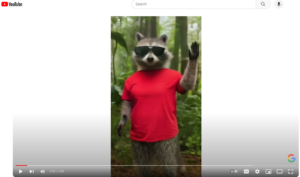Updated – (don’t) toss your cookies in 2024 (but boost your content superpower)
Note: in July 2024, Google reversed its decision and will retain 3rd-party cookies. As the Wall Street Journal reported on July 23,
“In a major reversal, Google is ending a plan to eliminate cookies in its Chrome browser after four years of efforts, delays and disagreements with the advertising industry.
“The decision to keep the pervasive tracking technology known as “cookies” in Chrome comes after a series of setbacks, as both digital-advertising companies and regulators objected to the plan and to Google’s proposed replacement technologies.
“Chrome users can already choose to block cookies in the browser’s settings. Now, instead of eliminating them, Google will present users with a prompt to decide whether to turn cookies on or off.”
* Please consider the new trend when reviewing older content below.
Did you experience webpage ranking and traffic convulsions in 2023? Many did (to one degree or another.) As beta versions of generative AI applications simultaneously started impacting digital marketing, search engine giant Google surprised marketers and web developers several times in 2023, spawning considerable volatility.

Google conducted high-impact algorithm updates no less than nine times in 2023. These included major search-engine-impacting core updates (as well as an AI-powered Search Generative Experience for selected users). And a delayed cookie-less future will finally materialize as 2024 progresses, heralding a renewed focus on content. As eMarketer reported, “The way marketers create, iterate, distribute, manage, and even think about content will be transformed…[and up to] 65% of US marketers are most excited about using generative AI to create and scale content faster,”
What’s on deck for the coming months? Here’s a high-level view for your consideration.
The “10 blue links” will shift
The coveted “ten blue links” – the previous organic search results “on the front page of Google” are shifting. As reported by the Wall Street Journal, a new era of search engines (together with SERPs – search engine results pages) are on deck. As beta versions get refined, expect to see AI-powered searches and videos augmenting static URLs and hyperlinks.
As privacy concerns tighten into regulation (in America and abroad), old “cookie” tracking solutions morph toward new models. Today, Google and other search engines deploy certain “signals” to help their automated ranking algorithms “determine which content demonstrates expertise, authoritativeness, and trustworthiness.” Long gone are the days when programmers and developers could “game” websites with stuffed keywords, programming tricks, and armies of staffers trying to spoof traffic numbers.
The Content Economy steps up
Indeed, the aspirational “content is king” focus is back. The search behemoth published a major Google Helpful Content Update to continue elevating “helpful content written by people, for people” and featuring such content on Google’s automated ranking systems. This includes traditional creative elements, including content on social media, advertising, and video content.
AI content not penalized (at present)

To be sure, at present, Google does not penalize AI-generated content. Of course, Google is rolling out beta versions of its own AI-guided content creators, including Bard, Google’s own version of ChatGPT, and VideoPoet, a multi-source Large Language Model (LLM) that can stitch together images and content to produce video visuals “stories.” (See Google’s AI-powered story-telling movie Rookie the Racoon here).
Microsoft already bundled its Copilot generative AI product into its Bing browser and 365 Office tech suites. X (Twitter) has entered the fray with Grok, a subscription-based AI assistant drawing on (among other things) X/Twitter content.
The browser wars are back. And the video/animation/image field of battle is opening up with Pika 1.0 joining DALL-E3 and others with rapid-fire video and image creation.
New applications for generative AI and content creators
Generative AI will vault upwards in 2024, rolling out all-new search functions and video capabilities, but content will still rule. An obvious caveat: a non-stop garden hose onslaught of AI-spawned content is repelling to consumers and markets already over-saturated with bad content. And legal parameters about where and how AI-content is indexed, integrated, and published are being tested and challenged.
The Wall Street Journal warned in December 2024 that news sources and publishers view generative AI-superpowered aggregate summaries as a potential “traffic-destroying nightmare.” On cue, just before 2024 opened, the New York Times sued both OpenAI and Microsoft for copyright infringement in federal court. The broad lawsuit asserts that “millions of articles published by The Times were used to train automated chatbots that now compete with the news outlet.”
Back to championing high-quality content (as opposed to third-party content scraped from other webpages), Google forged on with other industry-changing updates.
Tossing one’s cookies
A gold standard for digital marketing – the third-party tracking cookie – finally began quasi-crumbling in 2023. Google forged a near-insurmountable market share through third-party tracking cookies and its ubiquitous browser Chrome, which in 2024 planned to leverage the Google Privacy Sandbox to come in alignment with data privacy standards. Previously the highly valuable user cookie data came at a high cost to society – loss of user privacy.
Today, users (and various government agencies here and abroad) demand transparency, control and choice over how their personal data is collected, processed, and used. While Google and Chrome worked to phase in the cookie tossing phenomenon, Apple’s Safari (and also the modest FireFox browser) started blocking third-party cookies years ago.
But there’s more to cookies in 2024 and beyond.
A few myths about cookies
The old automatic placement of third-party cookies and their legendary ability to tell marketers way too much info about consumer preferences, tracking selections and even behavior, is the proverbial toast.
But the fact is that cookies – especially of the first-party variety – aren’t all going away. First-party cookies – the little piece of code that gets generated and stored on visitor webpages – are alive and well. As you likely know, first party cookies store and “remember” passwords, some basic data about visits and more.
But the infamous third-party cookie – the code that sends critical user data to marketers and others about overall online behavior and allowed profiles to be built – is now gone from automatic inclusion.
Unless of course you personally consent and accept such things. (Which a lot of people do when prompted at first visit.)
The point? The old cheap quick fix to scoop up user data (and behaviors) is headed for the trash heap of cookie history. But many emerging tools exist to help marketers optimize website and digital effectiveness.
Digitals ads still work fine
Google ads are powered by first-party cookies. While rules have changed for former rich and deep data returns in cookieland, there’s still plenty of data to be had.
While the intense focus on individual behavior has been removed, analytics can now track the aggregate behavior of groups.
As privacy laws get tougher, expect to see additional technological innovation, For example, contextual advertising allows you to place ads on websites that match your core key words.
A rolling cookie crumble
Third-party cookies on Chrome are set to crumble early in 2024, with just a proverbial handful of users (some 1%) being disabled from third-party cookies. But it will set the stage for a much larger migration to the Google Privacy Sandbox later in the year. As reported byTechCrunch, other browsers are taking different approaches.
More to come
While marketers will be making technical and media buying changes – many sweeping and sometimes wholesale – in 2024, generative AI can also significantly improve human-powered content.
Many new AI-enhanced writing tools exist to help professional content creators work more effectively (read: write and design better), access data more comprehensively (and certainly much faster) and hone their craft to new levels. This includes access to storytelling tools like AI-enhanced video and social media content. All-new levels of personalization – once an oxymoron in the digital world – can (and will) serve to elevate communication.
Generative AI ethics, guardrails, and applications will mix in with former search engine models and creative processes in the coming months (and years), providing a whole new level of real-time assistance. AI-generated content will boost web traffic. And more.
So let the cookies crumble. And strap in for a new generation of content creation and communication.
What’s your current view on AI in marketing – and communication in general? Let us know in the comments section below.
P.S. None of this copy was produced with generative AI – all 100% human.
By Michael Snyder, MEK
